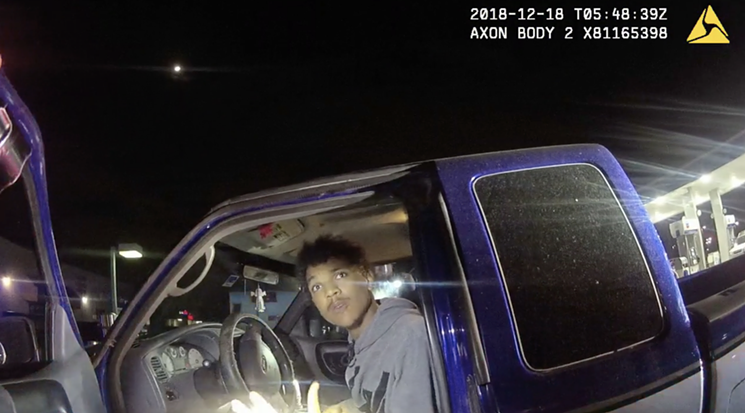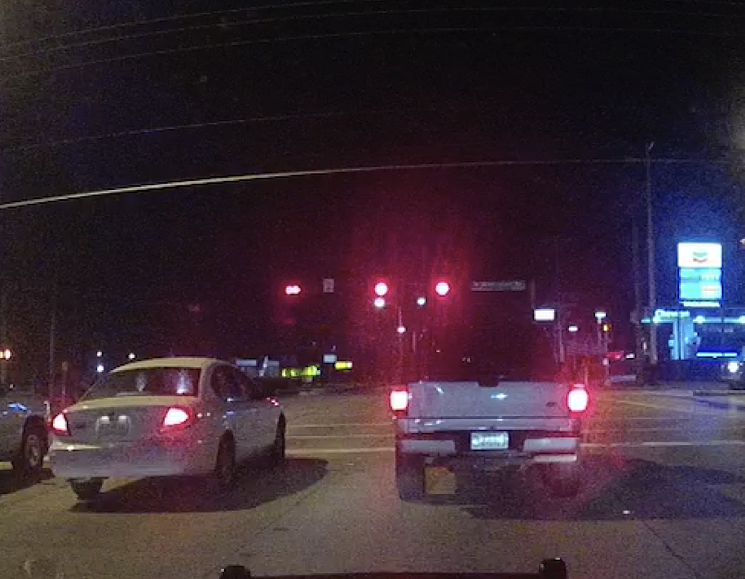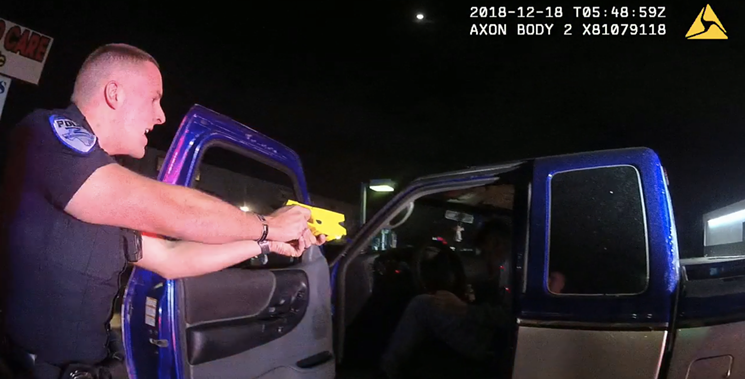It had been a normal day for the then 18-year-old Bonham. After he got out of school at Memorial Pathway Academy in Garland, he went to the restaurant where he worked and served tables. When Bonham got home from work, his friend Jordan came over. Jordan's girlfriend was going to pick him up later, so he wanted to leave his Ford Ranger at Bonham’s house.
After Jordan left, Bonham got a call from Sebastian, another friend, who had a flat tire and couldn’t get home from work. Bonham asked Jordan if he could take the pickup to pick up Sebastian. He told Bonham it was no problem. Bonham didn’t have a license at the time, but that didn't matter at the moment. “It was a friend in need of help,” he said.
He hit the road, and next thing he knew, a Richardson cop started tailing him. Then, red and blue lights flashed in the rearview mirror.

Neco Bonham said he thought he did everything right when pulled over by Richardson police in 2018, but he ended up in handcuffs after being shocked with a Taser and punched in the head by officers.
Richardson Police
“You got a headlight out, back right —uhh — brake lights not working, and also your license plate light is out, so all three of those things,” Winn replied, according to court documents.
After gathering Bonham’s information, Winn asked him to step out of the car. Bonham asked several times why he needed to step out of the car, but instead of giving an answer, Winn repeated the demand several times, eventually using force.
Winn and the other arresting officer, Michael Cross, yanked Bonham from the car. Winn shocked him with a Taser and punched him repeatedly in the head, pinning him to the ground.
The rest of the night and the following few days didn’t go much better for Bonham.
He was in Richardson jail for six days before being transferred to Lew Sterrett in Dallas County, where he spent less than a day. For the first three days in the Richardson lockup, Bonham sat in an isolation cell. He wasn’t allowed to shower or brush his teeth. After the third day, he was transferred to a normal cellblock.
The phones in the cellblock weren’t working, so Bonham asked if he and the other inmates could be transferred to another cellblock. “I told them that the phones weren’t working. The officer that spoke back to me, he said ‘That’s not my problem, you’re in jail,’” Bonham recalled.
Under his breath, Bonham mumbled, "You guys are acting like some bitches." The officer asked what he said, but Bonham just returned to his cell.
Then, the officer’s supervisor showed up to ask Bonham what happened, so he explained. But then the supervisor "just snapped," Bonham said, explaining that he "went from zero to a hundred."“I just tried to avoid them as much as possible because you never know when you’re going to run into a bad police officer, and I did.” – Neco Bonham
tweet this
“‘You can’t call my officers no bitch!’” Bonham remembered the supervisor screaming in his face.
Before turning around to return to his bunk, Bonham looked at the supervisor and said, “You’re a bitch. Your deputy's bitch.” Then, one of the officers struck him in the back of the head. Before he knew it, an officer had him in a chokehold on the ground. They dragged him from there to an all-concrete cell.
His mom found out what happened the day after he was arrested "and was devastated,” Bonham said. As soon as Bonham was allowed to make his phone call, he dialed his mom.
Now, in a federal lawsuit against the city of Richardson and the arresting officers, Bonham and his attorney say the two cops used excessive force and the reason for the 2018 stop was bogus. They say bodycam and dashcam footage from the arrest clearly refutes Winn’s claims that the taillights were broken.
His attorney, Damon Mathias, said the real reason for the stop is plain and simple: racial profiling. “I believe the reason he pulled him over is he saw a young Black man driving a car,” Mathias said. Winn is a white police officer.

When Neco Bonham asked why he was being stopped by police, the officer told him one of his brake lights were out. Dash camera footage from the night of the stop refutes this claim.
Richardson Police
Some counties and cities have cut people some slack for small amounts of marijuana in recent years. The Dallas Police Department has halted charges for misdemeanor amounts of cannabis in certain circumstances. In 2017, the Dallas City Council adopted a cite-and-release program that allowed officers at their own discretion to issue misdemeanor tickets to anyone caught with 4 ounces or less.
Additionally, the Fort Worth Police Department stopped citing and arresting people caught with small amounts of marijuana. In Richardson, though, police officers are still citing and arresting for weed possession, no matter the amount.
There’s a pretty clear disparity in how these laws are enforced. Nationally, Black people are 3.73 times more likely than whites to be arrested for marijuana. In Texas, Black people are 2.6 times more likely than whites to be arrested for possession, according to the ACLU.
The year of Bonham’s arrest, Black people accounted for more than a quarter of all traffic stops in the city of Richardson, although they represent only 9% of the city’s population. (Of course, people who don't live in Richardson drive there, too, but Black people make up only 23.6% percent of the entire population of Dallas County.)
According to court documents, the police officers are using the qualified immunity defense. It's a somewhat controversial legal defense that keeps government employees and officials from being held liable for constitutional violations. The defense usually works, but only if the employees can prove they didn’t run afoul of “clearly established” law.
Officers are not required to give a reason to ask a driver to exit a car during a traffic stop if there's a threat to safety, Mathias said, but the bodycam footage from the stop doesn’t indicate any impending danger to the cops. Bonham’s hands kept his hands visible. He didn't make any suspicious movements.“The thought process, which is completely illegitimate, is ‘I’m pulling over a young Black male in a hoodie and he probably has weed in the car, so I can do what I need to do.’” – Damon Mathias, Attorney
tweet this
Bonham said he felt he did everything right the night he got pulled over. Growing up, he was taught to always be respectful to others. He had the “law enforcement talk” with his mother when he was a child. “She told me, ‘Regardless, try and stay as calm and respectful as you can,’” he said.
Before that night, Bonham knew “there’s good police out there and there’s bad police,” he said. “I just tried to avoid them as much as possible because you never know when you’re going to run into a bad police officer, and I did.”
The big takeaway for cops from this whole situation should be “stick to your training," Bonham said. "You’re trained to de-escalate a situation, even in heightened situations. Stick to your training."
While Winn might not have been required to give him a reason, Bonham didn’t do anything wrong when he asked Winn why he needed to step out of the car. Winn could have just explained everything to Bonham, Mathias said, which could have de-escalated the situation. But Winn didn't seem to know any better. He would later claim that he’d never participated in de-escalation training, besides a brief session, and thought such tactics were reserved for mental health calls.
Richardson Police Sgt. Kevin Perlich said newer officers go through de-escalation training when they’re first hired. More tenured officers would go through this training during a period of the year they call “in-service,” during which they must go through several hours of training.
Training includes de-escalation protocols, Perlich said. According to court documents, the brief de-escalation session Winn spoke of was the training received during in-service. Perlich declined to share his thoughts on whether he thinks police departments need more or less de-escalation training.
Winn moved in on Bonham and there was a quick tussle. Winn claimed Bonham hit him. Bonham denied this, but excessive force allegedly ensued. Whatever happened, in 2019 the department dropped all charges against Bonham: assaulting a police officer, marijuana possession and resisting arrest.
Mathias said police departments need to focus more on de-escalation and weeding out the bad cops. In the lawsuit, Mathias argues that Winn showed a pattern of excessive force, racial profiling and escalation before stopping Bonham.
In October 2017, Winn was the subject of a disciplinary investigation because a DWI case was dismissed as a result of excessive force being used during the arrest. The lawsuit mentions several other examples of Winn using excessive force.
Also in 2017, Winn shocked, punched and elbowed another individual, a “noncompliant” Black male, during an arrest, court records say. Winn and another officer were recommended to undergo remedial training in use-of-force options. According to court documents, however, Winn never participated in the training.
According to the lawsuit, Winn received a written reprimand for escalating the Bonham traffic stop, but he didn't admit fault and said he would do it the same way again.

Neco Bonham's lawsuit describes Richardson Police Officer Parker Winn as unhinged and menacing.
Richardson Police
Some think the answer lies in "active bystandership," or intervention.
In April, two Democratic bills that require officers to intervene in cases of excessive force and immediately call for medical assistance if a suspect is injured made it through the Texas Senate with unanimous approval.
Senate Bill 2212, which required calling for medical assistance, was authored by Dallas Sen. Royce West. The bill also requires the officer to provide first aid, to the extent that they've been trained, until the medical assistance arrives on the scene. If taking these steps would put the officer or public in danger, the requirement is waived.
Houston’s Sen. Borris Miles authored SB 68, which would require officers to intervene in excessive force situations, in response to the death of George Floyd. He was killed by former Minneapolis police officer Derek Chauvin who placed his knee on Floyd’s neck for more than nine minutes. Floyd used to live in Houston.
"George Floyd may have been still alive today had this law been put in place," Miles told the Senate last month. "Because when you look at that film, there were numerous officers standing around. Not one of them thought to intervene."
The bill also requires officers who witness fellow cops using excessive force to immediately report it to their supervisors.
But the bills fall short of what was proposed in the George Floyd Law Enforcement Accountability Act, SB 1224, earlier this year. That bill would have removed immunity for officer from excessive lawsuits. It also would have made every law enforcement agency in the state adopt use-of-force policies that focus on conflict de-escalation and called for deadly force only as a last resort. Additionally, the Floyd Act would have barred arrests for most misdemeanors that usually only result in a fine.
“Overall, our police department is highly attuned to today’s important racial equity and social justice issues, and from top to bottom, we aim to be sensitive and responsive to any community concerns.” – City of Richardson
tweet this
Dallas recently allocated funds to put DPD officers through the Active Bystandership for Law Enforcement (ABLE) program, which aims to improve police culture by teaching officers how to prevent harm and misconduct by their coworkers.
It was developed in part by Ervin Staub, a psychology professor who created active bystander training for the Los Angeles Police Department after some of its officers were captured on camera brutally beating Black motorist Rodney King in 1991.
Staub studied how violent situations evolve and found that most people are "passive bystanders," who let things happen and assume no responsibility for others' actions. A good example of this is when officers stood by as Chauvin killed Floyd.
The program will teach officers to be "active bystanders" and include training scenarios in which police have to physically stop the actions of another officer. While DPD is expected to be the first police force in a major Texas city to fully implement the training, other North Texas departments have also applied for the program.
Alex del Carmen, a criminology professor at Tarleton State University in Fort Worth, told the Observer that in the past there’s been the belief that if a city changes its police chief, it can change the police culture. But he said this is only a bandage and that more is required.
“It takes a change of the command staff, oftentimes their policies [and] the relationship they have with city management,” he said.
They said city leadership works closely with the police chief “and unequivocally feels there is no systemic issue in the department with racial bias or insensitivity.”
Bonham disagrees.
Now 20, Bonham works for a solar energy company called Good Faith Energy. “I work nonstop every day trying to better myself, training to be a master electrician,” he said. In the meantime, he'll keep pursuing his lawsuit, seeking redress for how Richardson law enforcement treated him that night.












